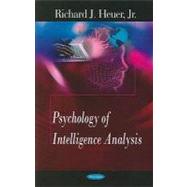
Note: Supplemental materials are not guaranteed with Rental or Used book purchases.
Purchase Benefits
What is included with this book?
| Introduction : improving intelligence analysis at CIA : Dick Heuer's contribution to intelligence analysis | p. 1 |
| Thinking about thinking | p. 15 |
| Perception : why can't we see what is there to be seen? | p. 21 |
| Memory : how do we remember what we know? | p. 31 |
| Strategies for analytical judgment : transcending the limits of incomplete information | p. 47 |
| Do you really need more information? | p. 65 |
| Keeping an open mind | p. 77 |
| Structuring analytical problems | p. 95 |
| Analysis of competing hypotheses | p. 105 |
| What are cognitive biases? | p. 121 |
| Biases in evaluation of evidence | p. 125 |
| Biases in perception of cause and effect | p. 135 |
| Biases in estimating probabilities | p. 153 |
| Hindsight biases in evaluation of intelligence reporting | p. 165 |
| Improving intelligence analysis | p. 179 |
| Table of Contents provided by Blackwell. All Rights Reserved. |
The New copy of this book will include any supplemental materials advertised. Please check the title of the book to determine if it should include any access cards, study guides, lab manuals, CDs, etc.
The Used, Rental and eBook copies of this book are not guaranteed to include any supplemental materials. Typically, only the book itself is included. This is true even if the title states it includes any access cards, study guides, lab manuals, CDs, etc.